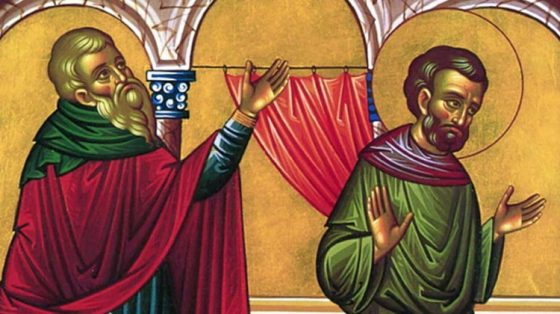
Apostolic Succession has been a critical issue since the second century. The importance of Apostolic Succession is misunderstood and/or deemphasized or disregarded by those who find themselves outside of the historic boundaries of Apostolic Succession. In the Early Church false teachers began to perpetuate false doctrines. They claimed authority from God or special revelations.
Apostolic Succession is the direct line of ordination and doctrine from the Apostles to the present episcopacy of the Church. There is an unbroken succession of bishops in the Orthodox Church back to the Apostles. It is more than a “pedigree.” It is not only an unbroken succession of the laying of hands, but an unbroken succession of faith through the office of the bishop.
There is an extensive amount of written material from the time of the Early Church, especially the writings of Ignatius of Antioch (69 AD) who was the bishop of Antioch and the second successor after the Apostle Peter in Antioch. While under arrest in epistles to his flock he explains the role of the bishop in the life of the Church.
The first instance of Apostolic Succession can be found in the beginning of the book of Acts. When Judas abdicated his office the Apostles saw it necessary for another to take his place. (Acts 1:16-26)
In order to maintain a succession of apostolic faith, at least three bishops are required to ordain a new bishop. The faith and beliefs of the candidate for ordination are extensively examined beforehand.
The primary work of the bishop is to preserve the content of the faith unchanged. As in a relay race, the bishop is to take the baton of faith that has been handed to him and to hand it to the next bishop unchanged. He is not allowed to write his name on the baton, repaint the baton, or notch the baton. He is to protect and preserve the baton and define the content of the baton to the flock.
Apostolic succession preserves Church unity. Organically it incorporates accountability. It assures that the teachings and practices of the Church are in sync with its apostolic foundations.
Every Orthodox clergyman through his bishop can trace his ordination back to the apostles as both a succession of the laying of hands and a continuity of faith.
For a more detailed study of Apostolic Succession please click here.
32890 hours ago

“Not as the world gives, do I give unto you” (John 14:27). But does this promise of our Lord apply not only to His peace, but to other blessings as well. Could it be, for example, that the self-confidence of a Christian needs to be very different ...

